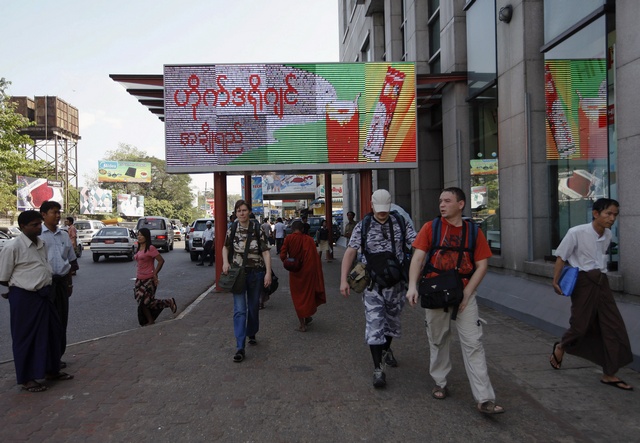Is it possible to develop tourism in a sustainable way in Burma, as the country seemingly transitions out of decades of military rule? That is the question on the minds of many, but bringing an inclusive and participatory approach to the military-led reform process in Burma is not easy.
Questions still remain about the sincerity of the government, which has yet to embrace transparency or accountability. Legislative changes that would signal a concrete shift towards democracy are lacking, as is evidence that the country is moving towards a greener, more sustainable economy. In tourism, similar hurdles remain.
One such area of much-needed reform is the Tourism Act of 1990, which includes no mention of responsibility or sustainability. Many of those who benefit from the country’s tourism sector under this act are government cronies and rich businessmen, not the poor and poorest.
An overhaul of the sector is being pushed on a number of fronts, and gained strength in 2011 when the National League for Democracy (NLD) published a paper encouraging tourism and suggesting that the industry can benefit the country without harming the environment. “We believe in tourism that is ethical and environmentally conscious,” the party said.
Conservation of nature is a priority in the paper, as is the creation of an industry that advances local’s livelihoods. Those who implement and participate in this type of tourism adhere to the minimising the impacts on the environment, and fostering environmental and cultural awareness and respect to allow for the creation of positive experiences for both hosts and guests.
Using this model, revenues would be directed towards financial benefits for conservation and empowerment of civilians. Responsible tourism supports international human rights and labour agreements and raises awareness concerning the respective area’s political, environmental and social climate.
A major signal for optimism however occurred this month when the government’s tourism ministry invited an array of stakeholders to Naypyidaw for the first ever Responsible Tourism Conference. Recognising the pending influx of millions of tourists over the coming years as political and economic reforms take root, the conference acknowledged Burma’s need to formulate a plan that advocates for the creation of a sustainable tourism sector.
Given the massive impact that tourism can have on a country, responsible tourism could become central to developing Burma’s nascent tourism sector, which would feed into wider economic growth. Burmese officials seem to be acutely aware that successful participation from the public and private sector depends on a wide range of critical factors that can be influenced by changes in policy.
This is exemplified by Htay Aung, the deputy tourism minister, who told delegates at the conference that both sectors should embrace responsible tourism. “If you don’t want to change, you cannot succeed,” he said.
Scepticism however remains over how exactly talk of responsible tourism will translate into practice in Burma. Stakeholders have voiced concern that the progressive rhetoric of the government might merely be correctional responses issued to achieve political legitimacy.
There is hope that Burma can avoid the mistakes made by other countries in the region. The Maldives, which enforces restrictive tourism policies, is still one of the poorest countries in the world. The economy is mono-structured and highly dependent on tourism, and while the sector has created many millionaires, the people on the whole have yet to benefit from the influx of tourists. On the contrary, they have become poorer due to inflation and many have migrated to India.
Some cracks are already visible in Burma, such as the spread of sex tourism. These issues need to be addressed before they get out of hand.
In popular tourist areas, inflation, the lack of tourism infrastructure and large-scale development projects rarely benefits all, but rather only enriches a few. The core problem is that tourism policy in Burma has to date not incorporated poverty elimination objectives. Given the massive impact of tourism on the world’s poor, how the sector’s legislative, institutional and policy reforms are made will become increasingly important.
For responsible tourism to flourish in Burma, benchmarks need to be met. Proven schemes should be emulated and a fair law needs to be instituted. Transparency concerning who gets what, and who wields power, will help to ensure the process is fair. If tourism stakeholders continue to engage in meaningful dialogue outside parliament, there will be more opportunities to adapt the country’s tourism sector into one that enhances livelihoods and benefits the poor. The government has an opportunity to show that the people of Burma are at the centre of the development agenda, and not those with privileged access to state resources.
Dr. Andrea Valentin is the founder of Tourism Transparency, a non-government organisation campaigning for an open and accountable tourism industry. Dr. Valentin recently returned from Burma’s first Responsible Tourism Conference held in Naypyidaw, where she presented on the benefits of pro-poor tourism and clarified that tourism can only be responsible if the poor and poorest benefit. Check out To for more information.



